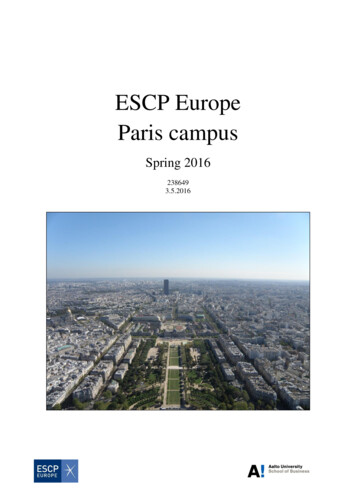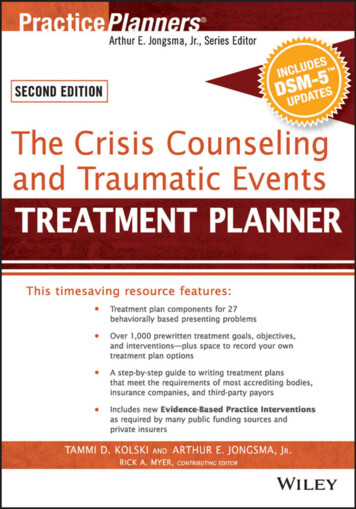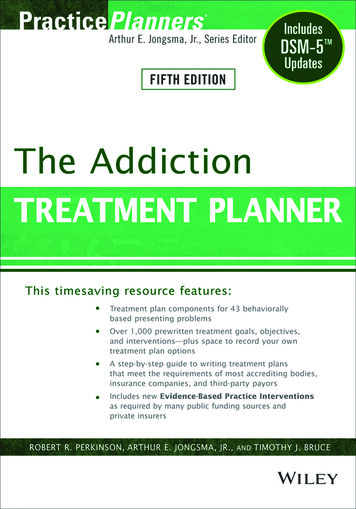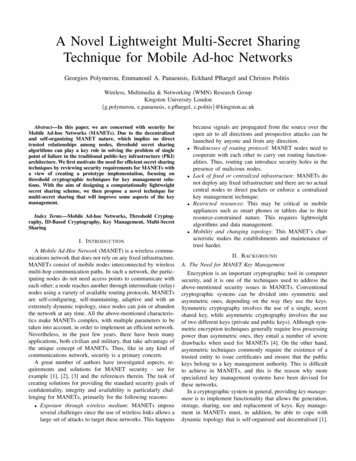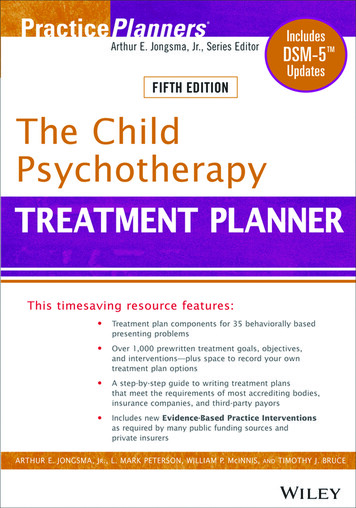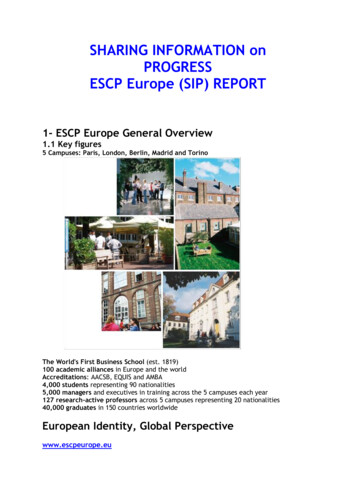
Transcription
SHARING INFORMATION onPROGRESSESCP Europe (SIP) REPORT1- ESCP Europe General Overview1.1 Key figures5 Campuses: Paris, London, Berlin, Madrid and TorinoThe World's First Business School (est. 1819)100 academic alliances in Europe and the worldAccreditations: AACSB, EQUIS and AMBA4,000 students representing 90 nationalities5,000 managers and executives in training across the 5 campuses each year127 research-active professors across 5 campuses representing 20 nationalities40,000 graduates in 150 countries worldwideEuropean Identity, Global Perspectivewww.escpeurope.eu
1.2 Historical contexts1.2.1 Founding MomentsESCP Europe has gone through important transformations from a French Grande Ecoletoward a multi-campus European business school with locations in France, the UnitedKingdom, Germany, Spain, and Italy. Established in 1819 in Paris, ESCP Europe is the world's oldest business school, foundedby a group of economic scholars and businessmen including the well-known economistJean-Baptiste Say and the celebrated trader Vital Roux. The school's vocation was totrain students for positions in industry and commerce as well as entrepreneurs. In 1869, at the peak of France’s first industrialization wave, ESCP Europe was acquiredby the Chamber of Commerce and Industry Paris, Ile de France* in its 50th year ofexistence. Since then, the Chamber of Commerce and Industry, Paris, Ile de Franceguarantees an important part of the financial resources of the school through an annualsubsidy. The 19th century had been the century of “entrepreneurs” and ESCP had played a majorrole in the diffusion of a culture of “entrepreneurship”. The 20th century was theclassical age of the “Grande Ecole”, with a shift towards the training of “managers”.ESCP was essentially focused on its “Grande Ecole” program until 1969 when itlaunched an Executive Education division for managers keen to pursue further training. In 1973, the Chamber of Commerce and Industry, Paris, Ile de France founded EAP (alsoknown as the European School of Management), in order to contribute to thedevelopment of Europe through management education. Students at EAP were requiredto study in at least three of the schools campuses (France, Germany, Spain and UK) inorder to earn their degree. The next decisive step was the merger in 1999 of ESCP and EAP to give birth to ESCPEurope.Today ESCP Europe is building on this history and on its proven capacity for reinvention toface new challenges. This is why ESCP Europe is confident about reinforcing anddeveloping its position as a “research-based” European business school.*To note: since January, 1st, 2013, Paris Chamber of Commerce and Industry has a new name: Chamber of Commerceand Industry, Paris, Ile-de-France (CCIR Paris, Ile-de-France). This new denomination focuses on the regional andeconomic arena of its activities in France.1.2.2 A European SchoolIn order to guarantee coherence in course content, structure, and the governance of thefive campuses, ESCP Europe introduced a governance charter in 2008 which proclaims theschool’s values as well as its modus operandi.Two types of values are distinguished in this charter. Firstly, classical academic valuessuch as excellence in both the production and transmission of knowledge. Secondly,broader European values such as consideration for the importance of history, tradition andculture, as well as a more transversal and multidisciplinary approach to business.Humanistic values and diversity are also at the center of the school’s culture.In short: Detecting talents - Teaching refinement - Imaginative research -With & for thecorporate world - European mission - Urban & urbane- Human in a Human World.* (See onour website the ESCP Europe Movie : e-movie/)ESCP Europe (SIP) Report 2013/MV2
1.3 What’s up at ESCP Europe? Herewith some of last newsYear 2013ESCP Europe celebrates 40 years of pan-Europeangrowth: "Building Europe for 40 years"ESCP Europe Business School has educated generations of international leaders andthinkers. Established in 1819 as the world's first business school, ESCP Europe is nowcelebrating 40 years as a pioneer of cross-border business education in Europe, markingthe opening of its campuses in the United Kingdom and Germany in 1973.The expansion ofthe European Economic Community to include the UK in 1973 coincided with ESCP Europeexpanding its intercultural management training, transforming itself into a truly Europeaninstitution. Before the Bologna Process created the European Higher Education Area, theSchool led the way by launching the innovative concept of pan-European higher education,offering its students the chance to study at its campuses in France, Germany and the UK.This resolutely modern style of business education continued to develop with the openingof a 4th ESCP Europe campus in Spain in 1988 and a 5th in Italy in 2004.For Edouard Husson, Dean of ESCP Europe, "This multi-campus model, anchored in Europeand open to the world, offers students the opportunity to address a range internationalmanagement issues from direct exposure to the business and culture of a new country.By establishing itself in the major European cities of Paris, London, Berlin, Madrid andTorino, ESCP Europe offers a unique style of teaching that is a major asset in building theprofessional future of our students."In 2013, ESCP Europe confirms its modern outlook and European identity by continuing tolead the way with innovative new cross-border programs, such as the Master in EnergyManagement and Master in Marketing and Creativity.To celebrate 40 years of cross-border education in Europe, ESCP Europe is organizing anumber of events throughout 2013.More information by contacting Andreas Kaplan, Director of Brand and CommunicationEuropeE-mail: akaplan@escpeurope.euOr available on the website of ESCP Europe ope-for-40-years-1/ESCP Europe (SIP) Report 2013/MV3
January 2013: Official launching of “Paris Nouveaux Mondes” alongside all the partnersof the héSam cluster (Pres). Inaugural lesson: “l’innovation et le numérique” said byMichel Serres, member of the famous French Academy “l’Académie française”, on the 29thJanuary 2013, at La Sorbonne.In 2010 ESCP Europe joined the héSam cluster (PRES) alongside 14 other partners, such asthe École Nationale d’Administration (ENA), École des Hautes Études en Sciences Sociales(EHESS), and Panthéon-Sorbonne University. In February 2012, the héSam cluster wasselected by an international jury and, after a three-year probationary phase, will beawarded the “Initiative of Excellence” label which recognized the top ten highereducation and research clusters in France. So, various research laboratories such as REFI,which studies financial regulations http://www.labex-hesal.eu/fr/refi/16 and which iscoordinated by ESCP Europe were launched. A doctoral school specialized in managementin collaboration with Panthéon-Sorbonne University was developed.ESCP Europe joined héSam as part of its strategic decision to become a “research-based”business school.December 2012: Introducing the Master in Energy ManagementAfter the successful launch of the Executive Master in Energy Management (EMEM) in 2011,ESCP Europe added to its portfolio a new postgraduate program: the Master in EnergyManagement (MEM).The MEM is a one-year, full-time postgraduate program for those aiming towards a careerin the energy sector. Taught in English at our London and Paris campuses, it is delivered bya world renowned faculty and specially selected industry practitioners. The MEM'sobjective is to help students understand the energy business environment and itsfundamental economic and technological concepts. Participants will gain the ability todevelop and implement strategies to address major issues in energy regulation and policy,as well as strengthening their ability to live and work in a highly multicultural andinternational environment. : www.escpeurope.euESCP Europe (SIP) Report 2013/MV4
November 2012: The French Ministry of Higher Education and Research has authorizedESCP Europe to confer doctoral degrees. This new enabling of ESCP Europe to confer aFrench doctoral degree strengthens the current positioning of ESCP Europe in theinternational academic environment.For 2003, ESCP Europe, in Berlin, has been delivering the degree “Doktor derWirtschaftswissenschaften“ (Dr. rer. pol.) ; in Paris, ESCP Europe already delivered a PhDdegree jointly with various French universities. The authorization to confer its Frenchdoctoral degree would to allowing ESCP Europe to reinforce its notoriety.October 2012: New Scholarships for the Executive MBAESCP Europe offers EMBA scholarships to offset tuition fees for outstanding candidates. Thecandidates who may benefit are those whose profiles will help further the School’s missionof creating a learning environment dedicated to excellence, multiculturalism and diversity.The new scholarships are offered to EMBA applicants who meet one of the followingcriteria: Woman leader; Executive working in an NGO or other non-profit organization; Executive working in an emerging market company; A fourth type of scholarship is offered to small and medium-sized companies(SMEs) to help them finance the management training of a high-potentialexecutive.In the Financial Times 2012 Executive EMBA Ranking, the ESCP Europe EMBA program hasbeen placed in the global top 3 for international business exposure, and 5th in the worldfor career progression. Salary increase three years after graduation is 77% on average. : www.escpeurope.euSeptember 201217th September 2012: ESCP Europe ranked 2nd in Financial Times' global Master inManagement league table. The Financial Times published its 2012 international ranking ofthe top Master in Management programs, on Monday 17 September 2012. ESCP Europe ‘sMaster in Management program (MIM) ranked in 2nd place, thereby confirming theoutstanding position among the 70 internationally ranked higher education establishmentsand universities. : www.escpeurope.euFrom 2nd to 5th of September 2012: Start@Europe Seminar 2012Start@Europe 2012: results of the Students’ Vote800 students, representing 35 nationalities, from ENA and ESCP Europe meet at WolfgangSCHÄUBLE. They are working on the reduction of the Member States’ deficits from the EuroZone. This seminar, Start@Europe is organized at the European Parliament and at theCouncil of Europe by ESCP Europe and ENA. Students speak out in favor of reinforcing theEuropean Union’s competencies in terms of economic governance. This event enjoyed thepatronage of the President of the European Parliament and of the General Secretary of theCouncil of Europe. It was also organized with the support of the City of Strasbourg.ESCP Europe (SIP) Report 2013/MV5
Students worked on the European Commission legislative bill on the monitoring andevaluation of budget plan proposals and to reduce excessive deficits in euro zone memberstates. This seminar was opened by Wolfgang SCHAÜBLE, Federal Minister of Finance ofGermany for this 4th edition of the Start@Europe Seminar launched by the AcademicDirection of ESCP Europe on September 2009. : www.escpeurope.eu1st September 2012: Edouard Husson appointed as Dean of ESCP Europe Business School“With effect of 1st September 2012, Edouard Husson has been nominated by the Chamberof Commerce and Industry, Paris, Ile de France as the Dean of ESCP Europe, the World’sFirst Business School (est. 1819). ( ./ )University professor in history of international affairs and modern conflicts, EdouardHusson holds a PhD from La Sorbonne and is alumnus of the prestigious Ecole NormaleSupérieure (ENS). Speaking many languages, Professor Husson has substantial internationalresearch and teaching experience. He specifically worked for eight years in the Germanacademic system, among others in the Munich-based Institute of Contemporary History,was invited several times for research stays in the United States, and holds an honorarydoctorate of the Brazilian Academy of Philosophy. Between July 2009 and August 2010,Edouard Husson, at that time General Secretary of the Council for the Development ofHumanities and Social Sciences (CDHSS), was advisor to the French Minister of HigherEducation and Research. In this function he was particularly in charge of theinternationalization of these disciplines within the educational domain. Since August 2010,Edouard Husson is Vice-Chancellor of the Universities of Paris. In this position, he has beenspecifically responsible for managing the universities’ transition to an autonomousgovernance structure, as well as overseeing the renovation of the real estate on thevarious campuses, and implementing excellence initiatives for the entire Ile-de-Franceregion. ( ./ )”Edouard Husson, Dean of ESCP Europe Business School“As the newly appointed Dean, Edouard Husson has the mission to continue ESCP Europe’sevolution, initiated over the past years by Professor Morand, as a business school with atruly European Identity which provides a Global Perspective on management issues. Acrossthe five campuses in France, UK, Germany, Spain and Italy, Edouard Husson will strengthenthe School’s European positioning by creating a new set of multicultural programmes andexecutive trainings in line with ESCP Europe’s vision to remain faithful to Europeanhumanistic values while at the same time anticipating the new ways of the world.”Sources 1-:- Abstract of the press announcement dated 27th August 2012- Abstracts of the ESCP Europe website- Photos and logos ESCP Europe- Photo Paris Nouveaux Mondes secom-Univ Paris1No copyright authorized.ESCP Europe (SIP) Report 2013/MV6
2- SustainabilitySome background dates and steps linked in PRME and UN GlobalCompact:2005: in May, ESCP Europe received the agreement to join and support the UN GlobalCompact as a European academic institution (M. Kofi Annan was the General Secretary incharge).2006: in April, the 1st delegation of students and the 1st dean of ESCP Europe since themerger ESCP plus EAP, attended their 1st NMUN at the UN’ headquarters in New York. Overyears, more and more students from the 5 campuses of ESCP Europe through theCall’ONU”, student and dedicated association, have integrated this project with tutoringsupport of members of the faculty specialized in international affairs. They becamerecurrent participants.In 2011, ESCP Europe Students rewarded at the NMUN New studentsrewarded-at-the-nmun-ny/?tx ttnews[pS] 1304200800&tx ttnews[pL] 2678399&tx ttnews[arc] -1Academic year 2007-2008: ESCP Europe joined the PRME Group. Two members of the ParisCampus Faculty: Olivier Delbard, Professor and Aurélien Acquier, associate Professordeclared their interest for the PRME Group concerning research and pedagogical issues inthe field of Corporate Social Responsibility and Sustainability.Academic year 2011-2012: ESCP Europe prepared the RIO 20 Conference with thesestakeholders (PRME UN Global Compact, The “Comité 21”, “Ministère de l’Ecologie, duDéveloppement Durable et de l’Energie “ MEDDE, the French Ministery in charge of thesustainable issues, the “CGE Conférence des Grandes Ecoles”).Since September 2011, ESCP Europe, represented by the project manager in charge ofsustainability, was an active participant of the enlarged “Club France Rio 20” to preparethe typology of a citizenship and societal integration in the Rio 20 Conference. And, plusseveral workshops organized by the CGE allowed to select the right process for academicinstitutions.March-April 2012: the proposal about “Governance and Sustainability” from ESCP Europewas accepted both by the MEDDE and the CGE and integrated to the examples of initiativeand actions built by Academic Institutions.April 2012: the Dean of ESCP Europe signed the RIO 20 Commitment, an initiative of thePRME group. Below this specific commitment signed by our former Dean, M. PascalMorand: “Our sustainability project between 2012 and 2015: ESCP Europe is committed tofurther developing both teaching and research devoted to sustainability as well as green campusactions and initiatives. In this respect, a new major concentration on « Management, socialinnovation and Sustainability » was launched in 2011 on the Paris campus (Professors AurélienAcquier & Olivier Delbard), together with a new specialization on « Sustainability management »taught in Berlin (Professor Sylvie Geisendorf). Besides, a major on « Social entrepreneurship » hasstarted in Madrid in 2011. Our objective is to have a 20% increase in students in these majors. Inthe field of Executive education, ESCP Europe is offering a 5-day program on the Management ofIndustrial Ecology with pioneer company Interface Inc., as of 2012.About 12 faculty members are working on sustainability issues (in various fields such as finance,supply chain and procurement, strategy, ethics, marketing, management control, economics) arenow collaborating on joint teaching and research projects.Regarding campus, green initiatives are developing and annual reporting is taking place.”September-December 2012: Several samples of ESCP Europe initiatives were integrated inthe “Priorités Plan vert”. See the official website of the MEDDE concerning /-Education-sensibilisation-et-.htmlESCP Europe (SIP) Report 2013/MV7
2.1 The Word of the DeanOur Commitment to the principles of the UN Global Compact and PRME principlesESCP Europe and Sustainable DevelopmentA Management school such as ours has a major responsibility to fulfill, to anticipate,encourage and broaden the fundamental changes in our society.With its five European campuses, ESCP Europe fully contributes to the knowledge economypromoted by the European Union. In this respect, sustainable development has become adeterminant factor and must be integrated into our mission as educators. Our action, to acertain extent, contributes to the progress and development of society through thestudents and managers we train.Sustainable development has a fundamental strategic dimension: when integrated bycompanies into their development policies, it turns out to be a competitive advantage. Asan educational enterprise, ESCP Europe is part of this competitive environment.Sustainable development is also a state of mind: what is at stake is to define progress in adifferent way by « meeting the needs of the present without compromising the ability forfuture generations to meet their own needs » (The much known sentence!).And, we could also say, we want to say: “becoming the forward looking designer of ourworld in order to be in sync with the present and create a desirable and sustainablefuture!” This means changing our behaviors and ways of thinking, both collectively andindividually. Is it not the role of a leading European Management school to show the way?To be responsible and efficient in your professional, economic and social environment aswell as in your life choices: by transmitting these values to our students and executiveparticipants, we shall contribute to a dynamic of progress fully taking sustainability issuesinto account. It is our responsibility to apply them every day in our activities.Edouard HUSSON, DEAN of ESCP Europe,Business SchoolESCP Europe (SIP) Report 2013/MV8
2.2 The PRME Principles.1 - Principle 1Purpose: We will develop the capabilities of students to be future generators ofsustainable value for business and society at large and to work for an inclusive andsustainable global economy.2 - Principle 2Values: We will incorporate into our academic activities and curricula the values ofglobal social responsibility as portrayed in international initiatives such as theUnited Nations Global Compact.3 - Principle 3Method: We will create educational frameworks, materials, processes andenvironments that enable effective learning experiences for responsible leadership.4- Principle 4Research: We will engage in conceptual and empirical research that advances ourunderstanding about the role, dynamics, and impact of corporations in the creation ofsustainable social, environmental and economic value.5 - Principle 5Partnership: We will interact with managers of business corporations to extend ourknowledge of their challenges in meeting social and environmental responsibilitiesand to explore jointly effective approaches to meeting these challenges.6 - Principle 6Dialogue: We will facilitate and support dialog and debate among educators,business, government, consumers, media, civil society organizations and otherinterested groups and stakeholders on critical issues related to global socialresponsibility and sustainability.7- Addendum Principle:We understand that our own organizational practices should serve as example of thevalues and attitudes we convey to our students.ESCP Europe (SIP) Report 2013/MV9
3. How ESCP Europe tries to integrate and to spreadout the PRME principles & UN Global Compact3.1 Mission Statement and Goals for ESCP Europe as defined by theDean:MISSION STATEMENT“The Mission of the School can be summarized as follows:ESCP Europe is a high level institution committed to:Producing and transmitting knowledge in management in accordance withinternational standards shared by the management education communityDeveloping business skills, fostering personal growth and the acquisition of thehuman qualities required for top-level executives.In accordance with European values and thanks to the diversity of talents recruited invarious countries of the world, it shapes business leaders with the multicultural skills,flexibility and knowledge to work in a global world.Through its European mission based on a multi-campus structure the school contributes tothe development of the competitiveness of European companies, the progress of societyand the performance of people and organizations in the global economy.GOALSThe school prepares its students and participants for the changing global environment andthe search for new engines of growth, but also instills in them a concern for sustainabledevelopment and the social role of companies, thus taking into account the individual’saspiration to take hold of his/her destiny.By developing its five European campuses in a balanced fashion, the school offers itsstakeholders an exceptional education and research setting that is international anddiversified from the outset whilst remaining sufficiently unified for its programs to beeffective.This mission is translated into three goals:G1Seek out and provide lifelong training for global management elites who areperfectly adapted to a multicultural environment, who bring a critical view and are asource of thoughtful action.G2Contribute to the production of knowledge needed for tomorrow’s managementaction by occupying a prominent place in international scientific debate and bytransferring this knowledge to the business world and to civil society in order to promoteenlightened decisions.G3To be the European school of management: choosing Europe as a base is consistentwith the school’s aim of supporting European development. This involves not onlystimulating the competitiveness of European companies, but also attracting current andfuture managers from other continents by showing them the diversity and richness ofmanagerial and economic practices on our continent.”ESCP Europe (SIP) Report 2013/MV10
3.2 Education - based on this European Model, ESCP Europeproposes in its portfolio :ProgramsGeneral Management Degree ProgramsMaster in ManagementMEBExecutive MBASpecialized Management Degree Programs18 Masters (full-time)8 Executive Masters (part-time)Executive EducationOpen programsCustom programsPhD – Doctoral Program www.escpeurope.euThese programs have as a common basis the choice of a cross cultural and/or transdisciplinary approach of sustainability.For example, in the Master in Management, the “Grande Ecole” or our core program,the faculty proposes majors of specialization on sustainability :Societal Entrepreneurship, MadridEnvironmental Management, BerlinManagement, innovation sociale et développement durable (120h), ParisElective courses (30h and 15h) and workshops specifically dedicated to sustainability areproposed to students and participants in our several programs (ex. Paris Campus MasterProgram, Elective courses : 5 (2011/2012); 6 (2012-2013)).Each year, new courses are delivered also by the faculty such as “International Business &Human Rights”, “Corporate social responsibility and sustainability strategies” (academicyear 2011-2012).New proposals of trans European programs are designed by the faculty and concerns allour specific targets and public: for example, Energy Management created in London andtransverse for our other campuses (Executive MS MS), Ecological and Industrial issues andthe management process of sustainability (Executive Education), CSR sessions in areassuch as Women and Leadership, Promote Diversity and fight against discrimination, Humanresources and social responsibility (Executive Education), European health MBA etc.Customs programs are also specifically designed for European and international firms. Thisapproach is very important to be in touch with new challenges and economic trends.Summer School Sessions are also organized such as ‘ESCP Europe und Potsdam Centrumfür Politik und Management veranstalten Summer School für „Sustainability“, 2011, forexample.ESCP Europe is focusing on new pedagogical approaches such as the learning outcomeprocesses.ESCP Europe (SIP) Report 2013/MV11
3.2 Research - contribution to knowledge production“-In keeping with our proximity to the corporate world and our goal of becoming a“research-based” business school, its research mission is to produce scientific excellenceand to be able to transfer knowledge both to the corporate world and to students /participants through teaching. Our faculty’s research not only generates publications ininternational and national scientific journals but also contributes to nourishing theprofessional community (companies, public authorities, professional associations, etc.) viareference works and "transfer" publications”Concerning Sustainability issues: the ESCP Europe develops expertise on various areas suchas environmental economics; E.U.CSR and environmental policy; environmental audit;green supply chain management; strategy and sustainability; ethics; sustainabilitymanagement; new sustainable business models, sustainability development and corporatesocial responsibility; sustainable logistics Publications by the Faculty on sustainable and C.S.R. issues – 2011 & 2012Academic articles 20Professional & scientific articles 2Chapters(inside books): 4Books 6Reports 1Thesis &HDR 1Conferences & seminars 18ESCP Europe WP 2ESCP Europe faculty are also involved in developing chairs, institutes, research centersand laboratories fostered on a large board of management issues. These researchprograms contribute to stimulate innovation and are source of creation of new strategicimplementations and proposals for companies and/or public organizations.Concerning recent actions dedicated to research on sustainability, to note:i7, the Institute for Innovation and Competitiveness and the consultancy firm ‘weaveAIR’ conducted this academic year a research project on ‘sustainable innovation’, inorder to identify best practices and performances drivers.“This survey ‘sustainable innovation’ refers to all approaches and initiatives developed bythe organization aimed at integrating environmental and social issues within its activity”The results of the survey and the new report on ‘sustainable innovation’ have beensubmitted during a conference on 12th June 2013.The study gives key teachings and recommendations and announces the advent of newmodels businesses for companies. Led with 34 leaders and managers of European largecompanies representing several sectors, the study also leaned on an online poll with morethan 300 international referees.ESCP Europe (SIP) Report 2013/MV12
« Innovation Développement Durable Nouveaux Business Models »Authors: Acosta, Pilar; Acquier, Aurélien; Carbone, Valentina;Delbard, Olivier; Gitiaux, Florent; Delphine Manceau; Ronge, Catherine and Julie Fabbri.June 2013 English Translation forthcomingIn May, 2013, a prospective study was also published by i7 on the development of the windenergy in France with a focus on comparing developments of other countries in Europe:“Quelle place pour l’énergie éolienne dans la transition énergétique ? Une analyse desenjeux d’innovation, de compétitivité et d’emploi” Authors: Morand, Pascal and JulieBastianutti.i7, the Institute for Innovation and Competitiveness is an academic Think Tank, createdand supported by ESCP Europe. Uploading of these reports available on the i7 website/ ivite/publicationsAnd the last news, in July,2013, but not the least: in order to contribute to thedevelopment of research in the specific area of sustainability, the ESCP Europe Facultycreated a multi-campus and transverse research center based in Berlin and led by Prof.Dr. Sylvie Geisendorf on the Berlin Campus.The goal is to develop interdisciplinary research, 15 members of ESCP Europe Facultyfrom 4 campuses are actually in this new Research Center:“Business & Society -Towards a Sustainable World”(SustBusy)In order to train students to the methodology and contents of a successful research, thefaculty proposes several fields of sustainable items to all students in all programs: byexample for the Master’s thesis of pre-experience students, or the research projects of theo
The World's First Business School (est. 1819) 100 academic alliances in Europe and the world Accreditations: AACSB, EQUIS and AMBA . ESCP Europe introduced a governance charter in 2008 which proclaims the school's values as well as its modus operandi. Two types of values are distinguished in this charter. Firstly, classical academic values
